Table of Contents
ToggleIntroduction
In the ever-evolving digital world, what is SEO and why it matters in 2025 is a question every marketer should ask. SEO, or Search Engine Optimization, is the process of optimizing websites to improve visibility on search engines. But in 2025, it’s more than just keywords and backlinks—it’s about delivering value, authority, and trust. As per Ayush Dalal, a digital marketing expert, the SEO overview for 2025 highlights a shift towards SEO automation, smarter algorithms, and enhanced user experience.
Understanding the benefits of SEO means recognizing long-term traffic, higher ROI, and sustainable brand credibility. The future of SEO revolves around AI-driven insights, semantic search, and voice optimization. SEO trends in 2025 focus on E-E-A-T content, fast-loading pages, and topic authority. Matching these trends requires updated SEO content strategy, integrating on-page SEO, schema markup, and UX-focused design.
Keeping up with keyword trends in 2025 is critical—searches are now conversational and intent-based. Marketers must align their content with measurable SEO KPIs such as CTR, bounce rate, and average position. For anyone serious about dominating the digital space, understanding what is SEO and mastering its evolution is no longer optional—it’s essential, as emphasized by Ayush Dalal.
What is SEO? And the Importance of SEO in 2025
Search Engine Optimization (SEO) is the practice of optimizing your website to rank higher on search engine results pages (SERPs), making it easier for users to find your content online. In 2025, SEO has become more important than ever due to increased online competition and evolving search engine algorithms. Understanding what is SEO means recognizing that it’s no longer just about keywords—it’s about delivering valuable content, user experience, and aligning with Google’s evolving priorities.
The importance of SEO in 2025 lies in its power to drive organic traffic, build credibility, and ensure long-term visibility for businesses online. With billions of searches every day, being visible in search results is essential. Brands that invest in strong SEO content strategies tend to outperform competitors, reduce reliance on paid ads, and establish deeper trust with users.
SEO also enables small businesses and startups to compete with larger brands on a level playing field. By understanding the benefits of SEO, companies can develop more intelligent, data-driven digital marketing campaigns. As highlighted by Ayush Dalal, staying updated with SEO trends in 2025 is a non-negotiable part of digital success. SEO today is more strategic, technical, and rewarding than ever.
What is SEO and How Does It Work in 2025?
In 2025, understanding what is SEO goes beyond just using keywords; it’s a multi-faceted strategy designed to align websites with user intent and search engine algorithms. SEO works by optimizing your website’s structure, content, and technical components to improve visibility on search engines like Google. As search engines become more intelligent, they prioritize high-quality, relevant content that provides value to users.
The process begins with keyword research, identifying what terms users are searching for—this ties directly into keyword trends in 2025. Afterward, content is created around those keywords while ensuring the site is technically sound, mobile-responsive, and loads quickly. This is followed by link-building and other off-page SEO efforts that signal your site’s authority. SEO tools now rely on SEO automation to track rankings, analyze traffic, and adjust strategies in real-time.
According to Ayush Dalal, successful SEO in 2025 depends on aligning your content with Google’s ranking factors, such as E-E-A-T (Experience, Expertise, Authority, Trustworthiness) and semantic search. With a smart SEO content strategy, you not only rank higher but also enhance user experience and conversion rates. Understanding how SEO works today is crucial for digital growth and long-term business success.
Definition of SEO (Search Engine Optimization)
SEO, or Search Engine Optimization, is the process of enhancing a website’s visibility in organic (non-paid) search engine results. In simple terms, what is SEO? It’s a digital marketing practice focused on increasing the quantity and quality of traffic to your website through search engines like Google, Bing, and Yahoo. In 2025, SEO is no longer just about keyword stuffing—it’s about understanding user behavior, search intent, and delivering content that answers queries effectively.
A strong SEO overview includes several elements: optimizing content using relevant keywords, improving site structure, enhancing mobile usability, increasing page load speed, and building backlinks. Modern SEO also incorporates structured data, voice search, and AI-based tools, which makes it more dynamic than ever before.
Ayush Dalal emphasizes that SEO in 2025 requires deep expertise, as search engines now focus heavily on E-E-A-T. This means your website must show experience, authority, and trustworthiness, especially in competitive niches. Additionally, understanding SEO KPIs—like organic traffic, click-through rate, and bounce rate—is essential for tracking performance and growth.
So, when asking “what is SEO,” the answer in 2025 is: a comprehensive, ever-evolving digital strategy that helps you stand out in a saturated online space.

How SEO Works in Today’s Digital Landscape
To truly understand what is SEO, it’s important to see how it functions in today’s digital environment. In 2025, SEO operates within a highly dynamic, AI-powered ecosystem where algorithms are smarter, user expectations are higher, and search trends evolve rapidly. SEO is no longer about shortcuts—it’s about aligning your content with real user intent while satisfying search engine criteria.
The way SEO works today involves three major layers: technical SEO, on-page SEO, and off-page SEO. On-page SEO focuses on optimizing content, meta tags, URL structure, and internal linking. Off-page SEO includes building high-quality backlinks and digital PR. Technical SEO ensures your site is crawlable, fast-loading, mobile-friendly, and secure. Together, these components create a seamless experience for users and search engines alike.
Ayush Dalal highlights that search engines now rely on natural language processing, machine learning, and SEO automation tools to deliver the most relevant results. Google’s algorithms prioritize high-value, well-structured, and trustworthy content. Therefore, creating a solid SEO content strategy that matches keyword trends in 2025 is essential for ranking success.
SEO in 2025 is user-first, data-driven, and heavily reliant on adapting to changes quickly. Mastering this landscape ensures your brand doesn’t just survive—but thrives online.
Essential SEO Elements (Technical, Off-Page, and On-Page SEO)
In 2025, SEO involves a number of essential elements that combine to improve the user experience and visibility of your website. A great SEO strategy is built on these three pillars: technical SEO, off-page SEO, and on-page SEO.
The aspects of your website that you have direct influence over are referred to as on-page SEO. This covers URL structure, heading tags, meta descriptions, content quality, and keyword optimisation. The objective is to make sure that your content fully addresses the user’s inquiry and complies with SEO trends for 2025. Here, SEO content strategy is crucial since it emphasises producing pertinent, thoroughly thought-out, and captivating material that satisfies search engine needs as well as user intent.\
On the other hand, off-page SEO refers to activities that are done outside of your website to improve its reputation and authority. Creating high-quality backlinks from reliable sites is the main component of this. Off-page SEO also involves brand references and social media presence.
Technical SEO ensures that your website is optimized for search engines in terms of speed, security, mobile-friendliness, and crawlability. It includes tasks like improving site speed, implementing HTTPS, fixing broken links, and optimizing for mobile users. Ayush Dalal emphasizes that to succeed in 2025, mastering all three components is essential for maintaining long-term organic growth and adapting to SEO trends in 2025.
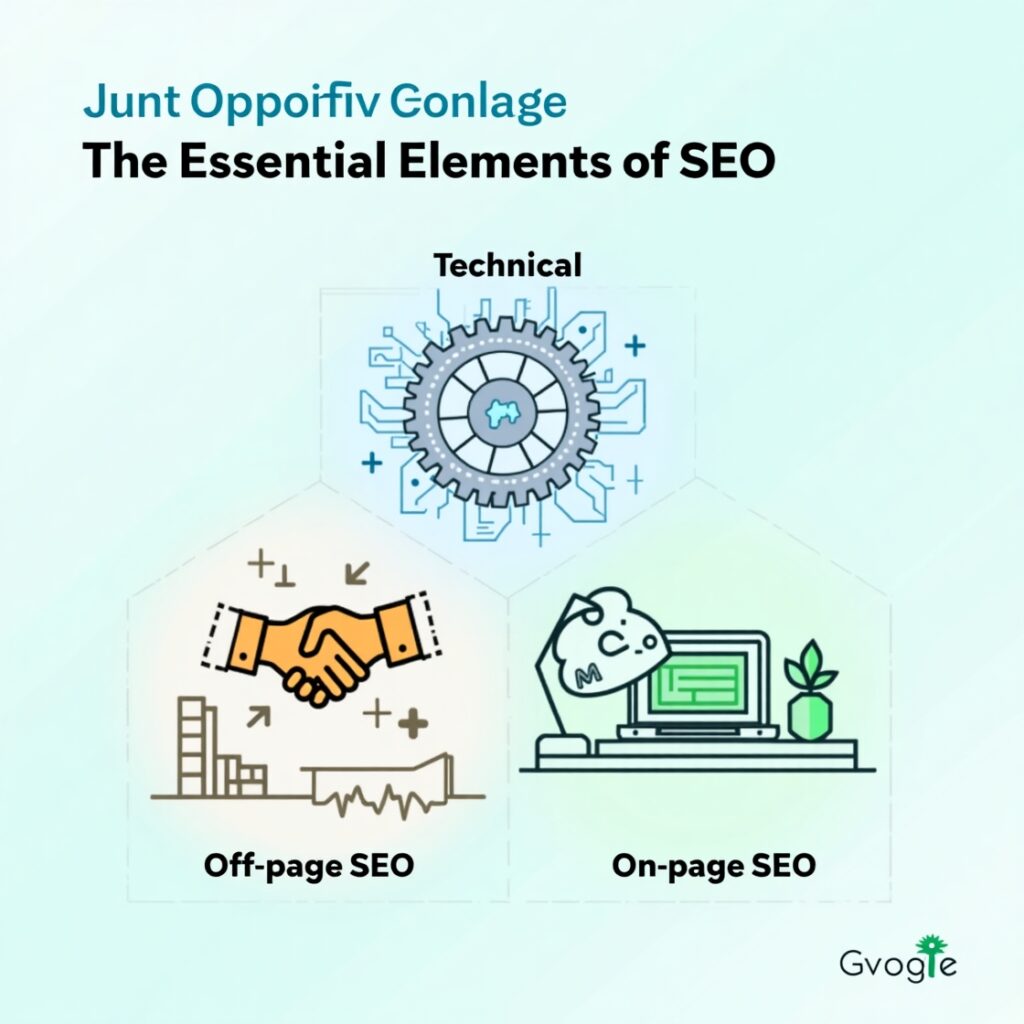
Why is SEO Important for Businesses in 2025?
In 2025, SEO is no longer optional for businesses aiming for online success. It’s a fundamental part of any digital marketing strategy. SEO benefits go far beyond just increasing website traffic. It helps build brand awareness, enhances credibility, and drives targeted traffic that is more likely to convert into leads and customers. What is SEO if not the key to making your business visible in a crowded digital space?
One of the primary reasons SEO is crucial for businesses today is its ability to boost organic visibility. Unlike paid advertising, SEO works to attract users who are actively searching for services or products similar to what you offer. As a result, businesses that invest in SEO content strategies and focus on creating high-quality, optimized content can see a significant rise in organic traffic.
Ayush Dalal points out that businesses leveraging SEO can gain a competitive advantage over those relying solely on paid ads. With SEO automation tools, it’s easier than ever to track performance, measure KPIs, and adjust strategies to maintain an edge over competitors. Moreover, SEO trends in 2025 indicate that companies who adapt to the latest SEO changes are the ones who thrive, as they meet the increasing demand for user-friendly, authoritative, and relevant content.
SEO Helps Improve Organic Visibility
One of the primary benefits of SEO is its ability to improve organic visibility, making it easier for potential customers to discover your website without relying on paid advertising. In 2025, search engines have evolved to prioritize user experience, which means websites that provide relevant, high-quality content tend to rank higher in search results. This increased visibility leads to more opportunities for engagement, conversions, and long-term business growth.
By investing in a well-rounded SEO content strategy, businesses can ensure that their website ranks for keywords that directly match user intent. When users search for a specific product, service, or answer to their problem, on-page SEO optimizations such as keyword-rich headlines, meta descriptions, and internal linking can make all the difference in how likely they are to click through to your site.
Ayush Dalal emphasizes that SEO trends in 2025 show a shift towards better content personalization and semantic search. This means that search engines are becoming better at understanding the context behind queries and delivering results that closely match what users are looking for. As businesses focus on delivering user-centric content, their organic visibility grows, leading to greater brand exposure and better customer retention.
SEO Drives Targeted and High-Intent Traffic
One of the most powerful aspects of SEO is its ability to drive targeted, high-intent traffic to your website. Unlike paid ads, which can bring a broad audience, SEO focuses on attracting visitors who are actively searching for what you offer. By optimizing for specific keywords—those with high search volume and relevance to your products or services—you can draw in users who are ready to engage and convert.
In 2025, SEO trends emphasize the importance of understanding user intent. It’s no longer enough to target generic keywords; businesses must focus on specific, long-tail keywords that align closely with the searcher’s needs. By optimizing content for these keyword trends in 2025, you ensure that your site ranks for queries that indicate a high level of interest and potential conversion.
Ayush Dalal suggests that an effective SEO content strategy can transform your website into a lead-generation machine. When users find exactly what they are looking for, they are more likely to trust your brand, explore your products, and ultimately make a purchase. This results in better SEO KPIs like increased conversion rates, lower bounce rates, and higher engagement.

Builds Trust and Credibility With Google and Users
Building trust and credibility is one of the key benefits of investing in SEO, especially in 2025. Google’s algorithms prioritize websites that are seen as authoritative, trustworthy, and valuable to users. To establish this credibility, businesses must focus on creating high-quality, user-focused content while adhering to the principles of E-E-A-T (Experience, Expertise, Authority, Trustworthiness). This means delivering content that not only ranks well but also resonates with users and meets their expectations.
For users, trust is established through content that answers their questions clearly, provides useful information, and presents itself in an organized, professional manner. When users consistently find what they need on your website, they are more likely to view your brand as reliable. For Google, trustworthiness is also earned through factors like secure site protocols (HTTPS), quality backlinks, and positive user experiences (such as fast load times and mobile-friendliness).
Ayush Dalal points out that SEO trends in 2025 highlight the growing importance of user experience in ranking. Google rewards websites that focus on trust and credibility by increasing their chances of ranking higher in search results. As businesses work to improve their SEO content strategy and create valuable, authoritative content, they build a reputation that benefits both Google and users, leading to increased visibility and engagement.
SEO is a Cost-Effective Long-Term Marketing Strategy
In 2025, SEO remains one of the most cost-effective long-term marketing strategies available to businesses. While paid advertising offers immediate results, SEO delivers sustainable growth by continually attracting organic traffic without the need for ongoing ad spend. This makes it a crucial investment for businesses looking to build a strong online presence without breaking the bank.
By focusing on optimizing your website for relevant keywords and creating valuable, high-quality content, businesses can achieve long-term success. Unlike paid ads, which require continuous investment to maintain visibility, SEO works by establishing a solid foundation for your website to rank organically over time.
Ayush Dalal emphasizes that with proper SEO planning and execution, companies can significantly reduce their reliance on costly advertising campaigns. Additionally, SEO automation tools help businesses track performance and make real-time adjustments, ensuring that their SEO efforts are always aligned with SEO trends in 2025. This ongoing optimization not only helps businesses increase their visibility but also ensures a better return on investment in the long run.
For businesses aiming for sustainable growth, SEO offers a cost-effective way to attract high-intent traffic, build brand credibility, and improve user experience—without the recurring costs of paid advertising.
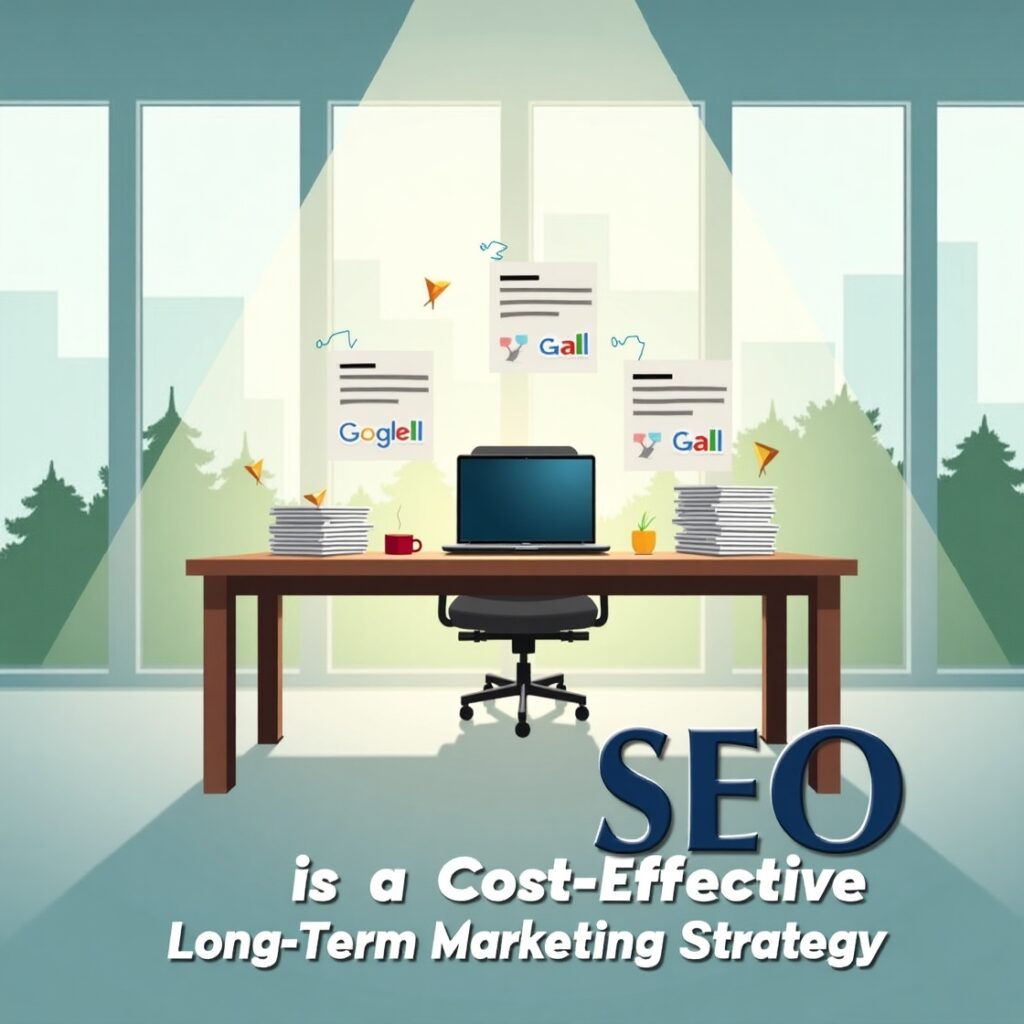
How SEO Has Evolved in 2025
SEO has undergone significant evolution over the past decade, and 2025 brings even more changes that businesses must adapt to in order to stay ahead of the competition. SEO trends in 2025 are largely driven by advancements in artificial intelligence, machine learning, and a deeper understanding of user intent. With search engines becoming increasingly sophisticated, SEO strategies need to evolve to meet the new demands of both search engines and users.
The most notable shift is the emphasis on E-E-A-T (Experience, Expertise, Authority, and Trustworthiness). In 2025, search engines like Google are prioritizing websites that demonstrate expertise in their field, backed by authoritative content and a track record of trustworthiness. This evolution reflects Google’s commitment to delivering more accurate and relevant search results, focusing not only on keywords but on content quality, relevance, and user experience.
Ayush Dalal highlights the importance of staying current with SEO automation tools and AI-driven strategies to optimize content in line with keyword trends in 2025. SEO professionals now rely on these technologies to quickly adapt to algorithm changes and efficiently track performance metrics. Businesses must embrace these innovations to stay competitive in an increasingly crowded digital marketplace.
In 2025, SEO is not just about ranking high—it’s about being seen as a credible, trusted, and authoritative source in your industry.
Impact of AI and Machine Learning on SEO
The integration of artificial intelligence (AI) and machine learning has revolutionized the way SEO works, making it more intelligent and user-focused. In 2025, AI is playing a critical role in how search engines evaluate and rank content, as well as how businesses optimize their websites. SEO automation powered by AI allows businesses to streamline their optimization efforts, making SEO more efficient and adaptable to changes in search engine algorithms.
AI-driven technologies, like Google’s RankBrain and BERT algorithms, have enhanced the ability of search engines to understand the context behind user queries, not just keywords. This shift towards semantic search means that businesses need to optimize their content for topics and themes, rather than just specific keywords. The ability of AI to understand user intent means that content must be more engaging and comprehensive, offering real value to the audience.
Ayush Dalal notes that AI and machine learning are also changing the way SEO professionals approach content strategy. With tools that analyze user behavior and content performance, businesses can gain insights into what resonates with their audience, enabling them to optimize their content accordingly. This allows for continuous improvement and adjustment to SEO trends in 2025, making SEO a dynamic and ongoing process.
In summary, AI and machine learning are enhancing SEO strategies by providing deeper insights into user behavior, improving content relevance, and automating SEO tasks, ensuring businesses stay ahead of the curve.
Google's Latest Algorithm Updates and SEO Trends
In 2025, Google’s algorithm updates continue to have a profound impact on SEO strategies, making it crucial for businesses to stay up-to-date with the latest changes. Google’s algorithms are now more sophisticated than ever, utilizing AI and machine learning to assess content quality, user experience, and relevance in new ways. These updates are increasingly focused on providing users with the best, most relevant results, pushing businesses to evolve their SEO tactics accordingly.
One of the biggest SEO trends in 2025 is the move toward a more holistic approach to content. Google now places a greater emphasis on E-E-A-T (Experience, Expertise, Authority, and Trustworthiness), rewarding websites that provide in-depth, authoritative content that addresses user needs. Websites that demonstrate expertise and credibility in their niche are more likely to rank higher.
Google’s recent updates have also focused on improving user experience, with factors such as page speed, mobile responsiveness, and Core Web Vitals playing a significant role in rankings. These updates have made on-page SEO optimization even more important, as businesses must ensure their websites are fast, mobile-friendly, and offer smooth navigation to maintain top rankings.
Ayush Dalal emphasizes the need for businesses to continuously monitor these updates and adjust their strategies. Staying ahead of SEO trends in 2025 ensures that businesses remain competitive, delivering content that aligns with what Google’s algorithms value most.
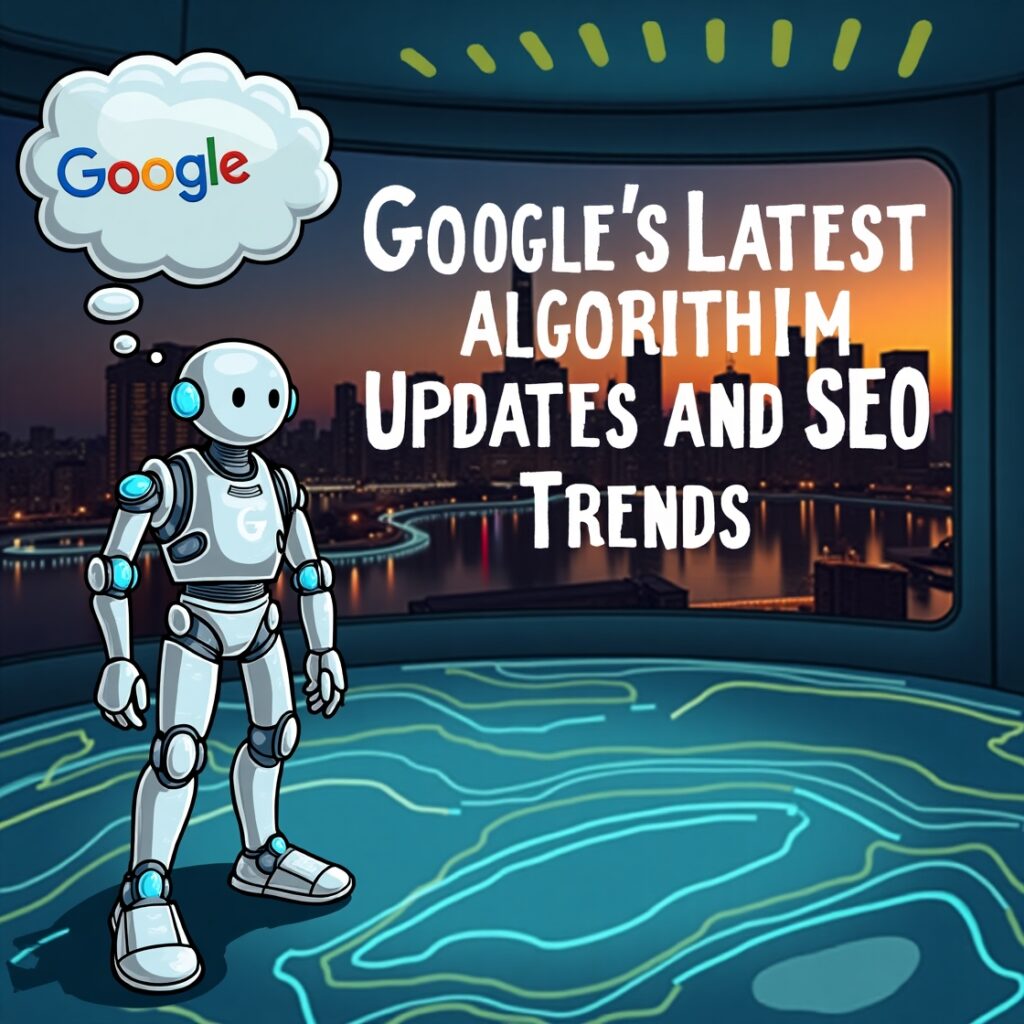
Shift Towards User Intent and Semantic Search
In 2025, SEO is no longer just about optimizing for specific keywords; it’s about understanding and addressing user intent through semantic search. This shift is a direct response to how search engines, particularly Google, have become more advanced in understanding the context behind search queries. Search engines now prioritize delivering results that match the user’s intent, whether they’re seeking information, looking to make a purchase, or trying to solve a problem.
Semantic search refers to the process by which search engines understand the meaning behind words and phrases, rather than relying solely on exact keyword matches. This approach enables Google to interpret complex queries, focusing on the topic as a whole. As a result, businesses need to create content that is comprehensive, contextually relevant, and designed to answer the full scope of a user’s query. Simply stuffing a page with keywords won’t suffice.
Ayush Dalal highlights that SEO content strategies in 2025 must embrace this shift by focusing on content that provides real value. This includes in-depth articles, engaging blog posts, and relevant multimedia that answer a wide array of user questions. By optimizing for user intent rather than specific keywords, businesses can ensure they remain competitive in the ever-evolving SEO landscape.
In conclusion, as semantic search continues to grow in importance, businesses must adapt by focusing on content that resonates with user intent and provides the most relevant answers, enhancing both user experience and SEO performance.
Types of SEO That Matter Most in 2025
As SEO continues to evolve, it’s crucial for businesses to focus on the types of SEO that will drive the most value in 2025. The core principles of SEO—on-page, off-page, and technical SEO—remain essential, but new trends and technological advancements have shifted the emphasis toward more specialized SEO strategies. Understanding the key types of SEO will help businesses maximize their efforts and align their strategies with current and future search engine algorithms.
In 2025, businesses must focus on local SEO, mobile SEO, and optimizing for E-E-A-T (Experience, Expertise, Authority, and Trustworthiness). These areas are becoming increasingly important as search engines prioritize content that delivers high-quality, relevant experiences for users. Each type of SEO plays a unique role in driving traffic and improving visibility across different channels.
Ayush Dalal suggests that businesses should also incorporate SEO automation tools to streamline their strategies and ensure they remain adaptable to ongoing SEO trends in 2025. By embracing these evolving SEO types, companies can optimize their websites and content to meet both user expectations and search engine requirements.
Let’s dive into the most critical types of SEO that businesses need to prioritize to stay ahead of the curve in 2025.

Local SEO for Small and Brick-and-Mortar Businesses
In 2025, local SEO has become more important than ever, particularly for small businesses and brick-and-mortar stores that want to attract customers in their geographic area. With the rise of mobile searches and location-based queries, optimizing for local SEO ensures that your business ranks highly when potential customers search for services near them.
Local SEO focuses on optimizing a business’s online presence to appear in local search results. This includes claiming and optimizing your Google My Business listing, using location-based keywords, and gathering positive reviews. By doing so, you increase your chances of appearing in Google’s local pack, the prominent list of businesses displayed at the top of search results for queries with local intent.
Ayush Dalal emphasizes that for small businesses, local SEO is a powerful and cost-effective strategy to increase visibility and attract nearby customers. Incorporating on-page SEO strategies, such as using localized keywords in titles, meta descriptions, and content, also improves your chances of ranking higher in local searches. Additionally, SEO trends in 2025 indicate that businesses should focus on mobile optimization, as most local searches are conducted via smartphones.
In summary, for small and brick-and-mortar businesses, local SEO is crucial to gaining visibility and driving foot traffic, making it an essential part of your SEO content strategy in 2025.
Mobile SEO and Voice Search Optimization
In 2025, mobile SEO and voice search optimization are two critical components of a successful SEO strategy. With mobile usage continuing to dominate, search engines like Google have made mobile-first indexing a priority. This means that Google primarily uses the mobile version of your website for ranking and indexing, making it essential to ensure that your website is mobile-friendly.
Mobile SEO involves optimizing your website’s design, speed, and user experience to cater to mobile users. This includes ensuring that your website is responsive, meaning it automatically adjusts to different screen sizes, and that it loads quickly on mobile devices. Page speed is particularly crucial, as slow-loading websites can negatively impact your rankings and lead to higher bounce rates.
Voice search optimization is also increasingly important in 2025, as more users rely on voice-activated assistants like Google Assistant, Siri, and Alexa. Voice searches tend to be more conversational, meaning that long-tail keywords and natural language are becoming more important in SEO content strategies. Optimizing for voice search involves using more natural, question-based phrases in your content and ensuring your website is structured to provide concise, relevant answers.
Ayush Dalal points out that businesses must optimize for both mobile SEO and voice search to stay competitive in 2025. As mobile and voice search continue to grow, businesses that prioritize these aspects will improve their chances of ranking higher in search results and capturing valuable traffic.
E-E-A-T (Experience, Expertise, Authority, Trustworthiness)
In 2025, E-E-A-T (Experience, Expertise, Authority, and Trustworthiness) has become a cornerstone of successful SEO strategies. Google’s search algorithms increasingly prioritize content that demonstrates these four key qualities. Websites that showcase experience, expertise, authority, and trustworthiness are more likely to rank higher in search results because they offer real value to users.
Experience refers to the practical knowledge or real-world experience behind the content. Google wants to ensure that content creators have hands-on experience in the topics they cover, which helps build credibility. For example, a blog post on digital marketing strategies written by a professional with years of experience in the field will rank higher than one written by someone with little to no background.
Expertise emphasizes the depth of knowledge on a subject. Google values content created by individuals who are recognized experts in their fields. Demonstrating a deep understanding of the topic and providing detailed, accurate information helps signal authority to both users and search engines.
Authority is earned through external validation, such as backlinks from reputable websites. The more authoritative sources that link to your content, the more credible your website appears in the eyes of Google.
Trustworthiness is built through factors like secure websites (HTTPS), user reviews, and transparency about your business. Google prioritizes sites that users can trust, knowing their personal data is safe.
Ayush Dalal stresses that businesses must optimize for E-E-A-T by creating authoritative, trustworthy content that is backed by real expertise. This will not only improve rankings but also help establish long-term credibility in 2025’s digital landscape.
Benefits of Investing in SEO in 2025
Investing in SEO in 2025 is one of the most strategic decisions businesses can make. As search engines continue to evolve, so do the opportunities to improve visibility, drive traffic, and ultimately, grow a business. By focusing on SEO, businesses can enjoy long-term benefits that provide a higher return on investment compared to other marketing methods, such as paid ads.
One of the primary benefits of SEO is improved organic traffic. Unlike paid advertisements that stop driving traffic once the budget runs out, SEO efforts compound over time. With the right optimization, businesses can attract targeted users who are actively searching for products or services. This leads to better engagement, higher conversion rates, and ultimately, more sales.
SEO also helps improve your website’s user experience (UX) by making it more user-friendly, faster, and mobile-responsive. In 2025, Core Web Vitals and other UX metrics are a major ranking factor, meaning websites that provide a seamless, enjoyable experience are more likely to rank higher.
Ayush Dalal highlights that SEO is a cost-effective marketing strategy because it doesn’t require a large, ongoing investment in paid advertising. Instead, businesses can rely on the organic reach SEO provides, resulting in sustainable growth. Additionally, investing in SEO allows businesses to build a strong foundation of credibility and trust with users and search engines alike.
In summary, SEO provides long-term benefits, from driving organic traffic to improving user experience and offering a cost-effective marketing solution that scales over time.
Higher Conversion Rates From Organic Traffic
One of the most significant advantages of investing in SEO in 2025 is the ability to drive higher conversion rates from organic traffic. Unlike paid ads, which can attract visitors but may not always lead to conversions, organic traffic tends to attract users who are more engaged and have a genuine interest in your product or service. This results in better-qualified leads and higher chances of conversion.
When users find your website through organic search, they are typically actively looking for a solution to a problem. For instance, a user searching for “best digital marketing strategies” is more likely to convert into a lead or customer for a business like Ayush Dalal that offers digital marketing services. Since they have already expressed interest in the topic, they are more likely to trust your content and move through the sales funnel.
Furthermore, organic traffic driven by effective SEO strategies is often more sustainable than paid traffic. Once you’ve optimized your website and achieved higher rankings, you can continue to attract traffic without additional advertising costs. This cost-effectiveness adds significant value to businesses looking for long-term growth.
Ayush Dalal emphasizes that SEO not only brings traffic but ensures it is the right kind of traffic—users who are ready to engage, making organic SEO one of the best strategies for boosting conversion rates in 2025.
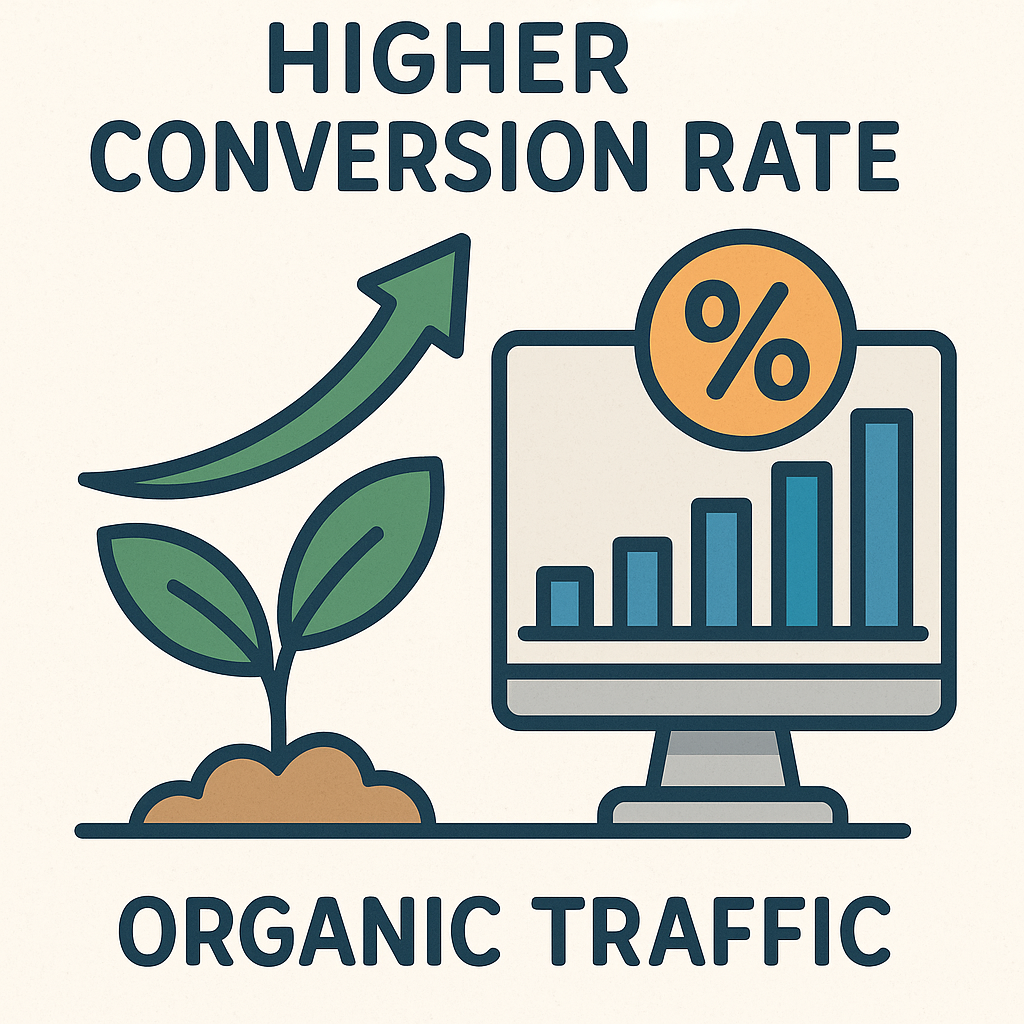
Competitive Advantage Over Paid Ads
In 2025, while paid ads continue to play an essential role in digital marketing, SEO offers a distinct competitive advantage. Unlike paid advertisements that require ongoing investment to maintain visibility, SEO provides long-term, sustainable traffic. Once you have achieved a strong organic ranking, your website continues to attract visitors without the need for continuous ad spend. This makes SEO a cost-effective strategy, especially for businesses looking to compete in an increasingly crowded digital space.
One of the key advantages of SEO over paid ads is the trust factor. Users are generally more likely to trust organic search results over paid ads, as they perceive organic rankings as more credible. This is particularly true in 2025 when Google’s E-E-A-T guidelines emphasize the importance of credibility, authority, and trustworthiness in ranking decisions. Websites that rank organically are often seen as more reliable and trustworthy compared to those relying solely on paid promotions.
Ayush Dalal points out that SEO helps businesses build a strong, credible online presence. It enhances brand authority through valuable content and by earning backlinks from other trusted sites. As a result, businesses with strong SEO rankings can gain a significant competitive advantage over those that depend exclusively on paid ads.
In summary, SEO offers more than just cost savings—it builds brand credibility, attracts quality traffic, and provides businesses with a long-term competitive advantage over those relying on paid advertising alone.
Improved Website UX and Core Web Vitals
In 2025, improving website UX (user experience) and optimizing for Core Web Vitals are key aspects of SEO that can significantly enhance a website’s performance. Core Web Vitals, a set of specific user-centric metrics defined by Google, measures how well a website provides a smooth and fast experience for its visitors. These metrics include loading speed, interactivity, and visual stability, all of which contribute to the overall user experience and, in turn, influence a website’s search engine ranking.
A well-optimized website that loads quickly and provides an intuitive, easy-to-navigate interface enhances user engagement and reduces bounce rates. When users have a positive experience on your website, they are more likely to stay longer, engage with your content, and ultimately convert into customers. This results in higher user satisfaction and better SEO rankings, making Core Web Vitals an essential focus for businesses in 2025.
Ayush Dalal emphasizes that focusing on Core Web Vitals not only improves SEO but also boosts brand reputation. Websites that load quickly and offer a smooth experience are seen as more professional and reliable by users, which can lead to greater trust and credibility. Moreover, improving website UX by optimizing for mobile devices and enhancing usability contributes to better engagement, driving more organic traffic and improving conversion rates.
In conclusion, improving website UX and optimizing for Core Web Vitals are vital to maintaining a competitive edge in 2025. They enhance both user satisfaction and SEO performance, helping businesses achieve better rankings and higher engagement.
Common SEO Mistakes to Avoid in 2025
When it comes to SEO, even small mistakes can have a significant impact on your rankings. In 2025, as search engines become more sophisticated, avoiding common SEO pitfalls is crucial to maintaining and improving your online presence. Here are some of the most common mistakes businesses should avoid to ensure their SEO strategies are effective and aligned with the latest standards.
One of the most frequent errors is keyword stuffing—the practice of overloading content with keywords in an unnatural way. This tactic may have worked in the past, but today, search engines focus on content quality and relevance. Over-optimization can lead to penalties, negatively affecting your rankings.
Another mistake is ignoring mobile responsiveness. With more searches happening on mobile devices, having a mobile-friendly website is no longer optional. Websites that aren’t optimized for mobile users can result in a poor user experience and lower rankings on search engines.
Technical SEO errors are also a major issue. Slow loading times, broken links, or poor site architecture can all hurt your website’s performance and rankings. Ensuring your website is technically sound and adheres to Core Web Vitals is essential for both user experience and SEO success.
Ayush Dalal highlights that businesses must regularly audit their websites to ensure they are free of these mistakes. By focusing on content quality, mobile optimization, and technical SEO, businesses can avoid common pitfalls and stay ahead of the competition in 2025.
In summary, to maintain a strong SEO presence in 2025, avoid keyword stuffing, ensure mobile responsiveness, and address any technical SEO errors to improve site performance and rankings.
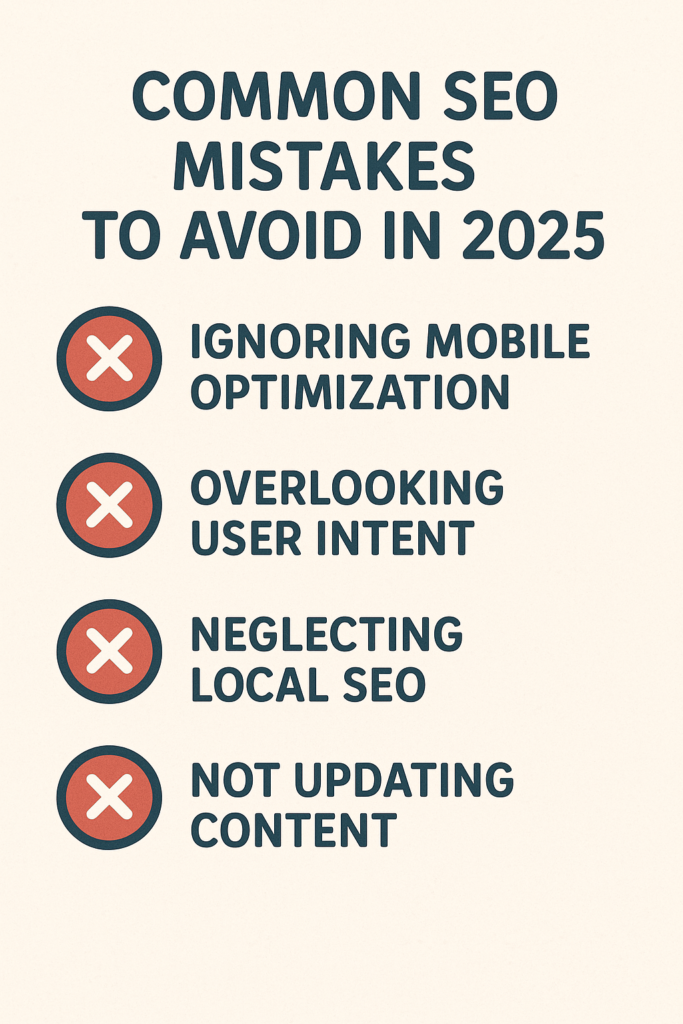
Keyword Stuffing and Outdated Techniques
One of the most outdated and detrimental practices in SEO is keyword stuffing. In the past, filling a webpage with as many target keywords as possible was seen as an effective way to improve rankings. However, search engines have evolved significantly, and today, Google and other search engines prioritize content quality, relevance, and user experience over raw keyword density.
Keyword stuffing not only results in poor content readability but also risks penalties from search engines, which can severely harm your rankings. In 2025, SEO strategies that focus on high-quality, well-structured, and informative content will perform much better than those that rely on outdated tactics like overuse of keywords.
To avoid keyword stuffing, businesses should focus on creating content that answers users’ questions and provides real value. Instead of inserting the same keyword repeatedly, use a natural, conversational tone and include variations of the keyword (also known as LSI keywords, or Latent Semantic Indexing keywords) to ensure the content reads naturally while still being optimized for SEO.
Ayush Dalal emphasizes that to stay competitive in 2025, businesses should update their content strategy by avoiding outdated techniques such as keyword stuffing. Instead, businesses should aim for SEO content strategies that focus on user intent and provide a seamless experience.
By focusing on the quality of content, relevance to user needs, and a natural keyword integration, businesses can ensure their websites remain competitive in the evolving SEO landscape.
Ignoring Mobile Responsiveness
In today’s digital landscape, ignoring mobile responsiveness is one of the most detrimental SEO mistakes businesses can make. With the vast majority of internet users accessing websites from mobile devices, Google and other search engines have placed greater emphasis on mobile-first indexing. This means that Google now primarily uses the mobile version of a website to determine rankings, making mobile optimization essential for any business aiming to maintain a competitive edge in 2025.
A mobile-responsive website adapts its layout, images, and content based on the screen size of the device, providing an optimal viewing experience. Websites that aren’t mobile-friendly can lead to a frustrating user experience, such as text being too small to read, images not loading correctly, or navigation being difficult. This not only affects user satisfaction but also negatively impacts bounce rates and conversion rates.
Ayush Dalal stresses that businesses must ensure their websites are mobile-responsive in 2025. Failing to do so can result in poor rankings and lost opportunities. With mobile users being a significant portion of web traffic, businesses that fail to optimize for mobile risk losing their audience to competitors who have adapted to mobile-first indexing.
In summary, to maintain strong SEO rankings in 2025, businesses must prioritize mobile responsiveness. This not only improves user experience but also ensures websites meet Google’s mobile-first indexing requirements, driving better rankings and higher user engagement.
Poor Site Speed and Technical SEO Errors
In 2025, site speed and technical SEO are critical factors for achieving strong rankings and a positive user experience. Google has long considered site speed as a ranking factor, and it continues to play an essential role in SEO performance. A slow-loading website not only frustrates users but can also lead to a higher bounce rate, which negatively impacts rankings.
Users today expect websites to load quickly. According to research, the likelihood of a visitor abandoning a page increases dramatically as load time increases beyond a few seconds. A website that takes too long to load is likely to lose potential customers, making site speed optimization a must for businesses looking to improve SEO in 2025.
In addition to site speed, technical SEO errors—such as broken links, crawl errors, poor URL structure, or improper redirects—can significantly impact your website’s rankings and user experience. Google and other search engines use crawlers to index your site, and any technical issues can prevent them from properly crawling and indexing your pages. This can lead to lower visibility in search results.
Ayush Dalal emphasizes that businesses should conduct regular SEO audits to identify and resolve technical SEO errors. By focusing on improving site speed and ensuring a technically sound website, businesses can enhance user experience and secure higher rankings in search engines.
In conclusion, site speed and technical SEO are fundamental to the success of any SEO strategy. Businesses that prioritize these factors can improve both user experience and search engine rankings in 2025.

Future of SEO: What to Expect Beyond 2025
The future of SEO looks promising as technology continues to evolve, and businesses adapt to the changing digital landscape. As we move beyond 2025, SEO will undoubtedly become more sophisticated, with new challenges and opportunities emerging. Staying ahead of these trends is essential for businesses that want to maintain a strong online presence.
One of the most significant shifts in the future of SEO is the increasing influence of artificial intelligence (AI) and machine learning. Google is already utilizing AI to enhance search results, and this trend will continue to grow. AI-driven algorithms will be able to better understand user intent and deliver highly relevant search results, making it more important than ever to optimize content for user intent rather than just keywords.
Another key development in the future of SEO is the growing importance of semantic search. As Google advances its understanding of natural language processing, SEO strategies will need to focus on providing comprehensive answers to users’ queries. This means that businesses will need to create content that not only targets specific keywords but also aligns with broader topics and user needs.
Ayush Dalal believes that SEO will become even more integrated with other digital marketing strategies, creating a more holistic approach to online visibility. From content marketing to social media and voice search, businesses will need to ensure that their SEO efforts are aligned with broader digital marketing objectives to succeed beyond 2025.
In summary, the future of SEO beyond 2025 will be shaped by AI, semantic search, and an increasingly integrated digital marketing landscape. To stay competitive, businesses must adapt to these changes and optimize for evolving technologies and user expectations.
Role of AI-Generated Content and Human-Centric Optimization
In the future of SEO, one of the most significant changes will be the rise of AI-generated content and the continued importance of human-centric optimization. While AI is increasingly capable of producing high-quality content, search engines like Google prioritize content that is both useful and engaging for human users. This means that although AI-generated content can be an excellent tool for producing scale, it’s crucial to maintain a focus on user intent and human experience.
AI tools can help streamline content creation by providing topic suggestions, generating drafts, and optimizing content for certain keywords. However, Ayush Dalal emphasizes that businesses should avoid relying solely on AI for content creation. Human-centric optimization focuses on ensuring content is written with the user’s needs in mind, providing valuable information in a readable, engaging format that enhances the user experience.
Moreover, Google and other search engines are becoming better at distinguishing between high-quality, human-generated content and AI-produced text that lacks depth or nuance. Content that resonates with users and answers their questions effectively will continue to perform better in search rankings. Therefore, businesses need to blend AI-generated content with human expertise to produce content that is both informative and optimized for SEO.
As AI evolves, the balance between automation and human input will play a critical role in shaping SEO strategies. In the coming years, businesses that focus on creating content that’s relevant, authoritative, and human-centered will have the competitive edge in SEO.
In conclusion, while AI-generated content has a growing role in SEO, businesses must prioritize human-centric optimization to ensure they meet the needs of their audience and stay ahead of search engine algorithms.
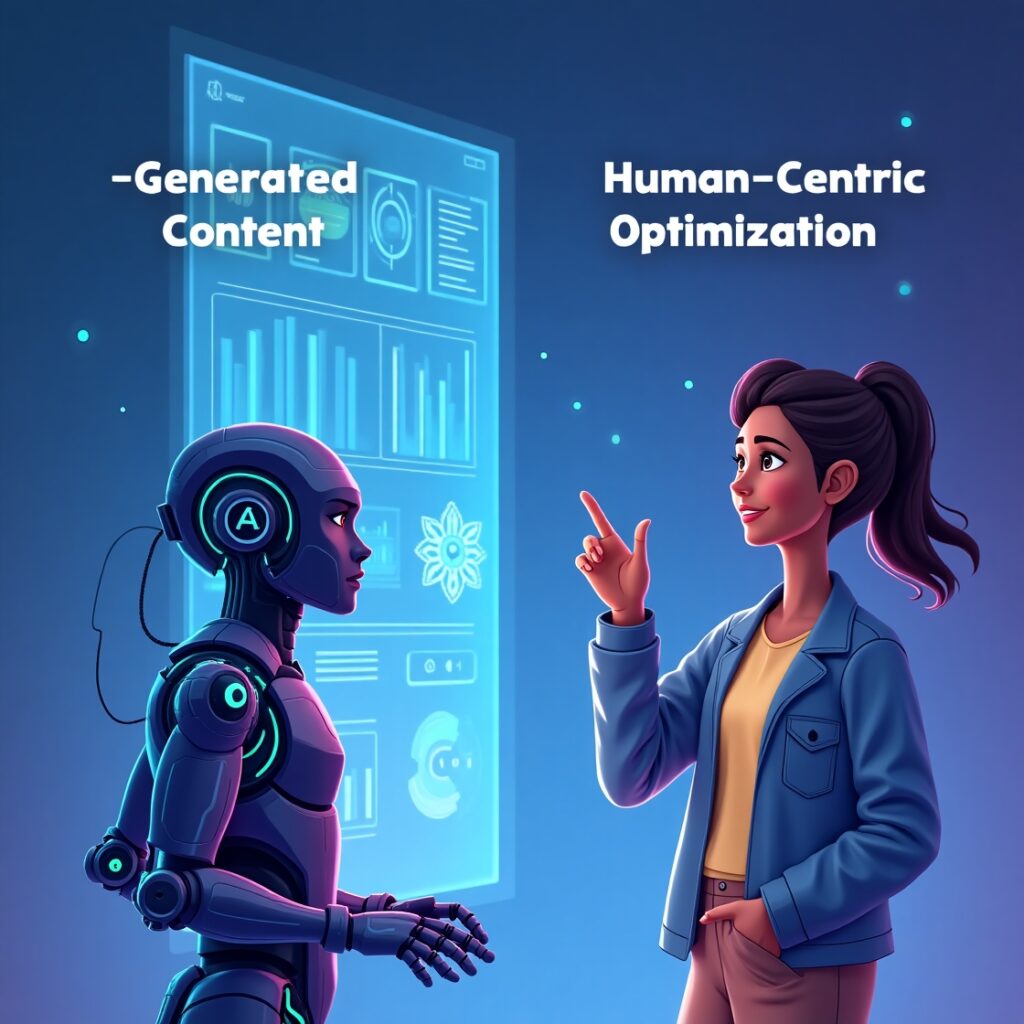
Semantic Search and the Rise of Zero-Click Results
As we move beyond 2025, semantic search will become increasingly central to SEO strategies. Google and other search engines are enhancing their ability to understand the meaning behind search queries rather than just focusing on individual keywords. This shift in how search engines interpret user queries is transforming how businesses approach SEO.
Semantic search allows search engines to better understand the context, intent, and nuances of a search query. For instance, instead of relying on exact keyword matches, search engines will prioritize content that provides comprehensive and contextually relevant answers. This evolution means that businesses need to focus on creating content that not only targets keywords but also answers broader questions and provides value to users.
Another significant change driven by semantic search is the rise of zero-click results. These are search results that appear at the top of the search engine results page (SERP) and provide direct answers to users’ questions without requiring them to click on a website. Examples include featured snippets, knowledge graphs, and local packs. Ayush Dalal points out that businesses can optimize their content to appear in these zero-click results by focusing on answering specific user queries in a concise and clear manner.
To capitalize on these changes, businesses must focus on creating content that aligns with user intent and provides the most relevant and accurate answers. By doing so, they can increase their chances of appearing in zero-click results, which will not only improve visibility but also enhance the user experience.
In conclusion, semantic search and the rise of zero-click results will shape the future of SEO. Businesses that optimize their content for user intent and provide valuable, context-rich information will be best positioned to thrive in this new SEO landscape.
Why SEO Will Always Be Relevant
Despite the rapid advancements in technology, SEO will remain an essential aspect of digital marketing for businesses in 2025 and beyond. As Google and other search engines continue to evolve, SEO will adapt, but the core principle remains the same: connecting users with relevant, high-quality content. The demand for businesses to appear in search results, particularly on the first page, will never diminish, making SEO crucial for long-term success in the digital world.
Ayush Dalal emphasizes that SEO will always be relevant because it directly impacts a business’s visibility, credibility, and authority online. Search engines are the primary way users discover content, products, and services. With the overwhelming amount of information available on the internet, users rely on search engines to help them find the most relevant and trustworthy resources. Businesses that invest in SEO ensure that they’re visible when potential customers search for solutions to their problems.
Moreover, as search engines become more sophisticated, businesses will need to focus on user intent, mobile optimization, and technical SEO to maintain their rankings. The evolution of AI, semantic search, and other emerging technologies will only make SEO more integrated into overall digital marketing strategies. By keeping up with these trends, businesses can maintain a competitive edge.
In conclusion, SEO will always be relevant because it ensures businesses remain discoverable in a crowded online space. As long as Google and other search engines are the primary means of discovering content, businesses must prioritize SEO to stay visible and meet their customers’ needs.

Conclusion: Why SEO is a Must-Have Digital Skill in 2025
As we look toward 2025, it’s clear that SEO will remain one of the most crucial skills for digital marketers, businesses, and content creators. With the continuous evolution of search engines, the growth of AI, and the shift towards user-centric content, the need for SEO expertise will only intensify. Businesses that fail to adapt to these changes risk losing visibility in an increasingly competitive digital landscape.
Ayush Dalal underscores that SEO is more than just a technical skill; it’s an essential part of any digital marketing strategy. Understanding SEO allows businesses to ensure that their content reaches the right audience, at the right time, and through the right channels. As Google becomes smarter and more focused on user intent, businesses that invest in SEO can stay ahead of the curve, attracting more relevant traffic and fostering stronger engagement with their target audiences.
In 2025, SEO will be intertwined with many other digital marketing disciplines, such as content marketing, social media strategy, and even AI-driven optimization. Mastering SEO not only helps businesses rank higher but also improves user experience, builds trust, and boosts long-term organic growth.
In summary, SEO will continue to be a must-have digital skill in 2025. Whether you’re a business owner, a marketer, or a content creator, understanding and implementing SEO strategies will be key to thriving in the digital age.
SEO (Search Engine Optimization) is the practice of optimizing websites to improve their visibility on search engines like Google. In 2025, SEO is more important than ever due to increased online competition and algorithm changes focused on user intent and experience. According to Ayush Dalal, SEO is key to attracting high-quality traffic, building trust, and ensuring long-term digital growth.
Key SEO trends in 2025 include AI integration, semantic search, zero-click results, mobile-first indexing, and a strong emphasis on E-E-A-T (Experience, Expertise, Authority, Trust). Ayush Dalal recommends optimizing for voice search, mobile usability, and human-centric content to stay competitive.
The main benefits of SEO for small businesses include increased organic traffic, improved online visibility, higher credibility, and cost-effective long-term marketing. SEO helps local businesses connect with high-intent customers and build authority in their niche, according to Ayush Dalal.
On-page SEO involves optimizing elements within your website—like content, title tags, and internal links. Off-page SEO focuses on building external signals such as backlinks and social media presence. Both are essential for a strong SEO overview, says Ayush Dalal.
SEO KPIs (Key Performance Indicators) are measurable values that track SEO success. These include organic traffic, bounce rate, keyword rankings, and conversion rates. Tracking SEO KPIs helps businesses understand what’s working and what needs improvement, according to Ayush Dalal.
SEO automation powered by AI has revolutionized how we research keywords, create content, and audit websites. However, Ayush Dalal emphasizes that while AI is a tool, human expertise is still crucial for effective SEO that aligns with Google’s algorithms and user expectations.
An effective SEO content strategy ensures you’re targeting the right keywords, answering user questions, and building topical authority. Quality content improves dwell time and increases the likelihood of ranking higher in search results. Ayush Dalal advises consistent publishing and regular updates for best results.
Semantic search interprets the meaning and context behind a search query rather than relying on exact keywords. In 2025, optimizing for semantic search means focusing on user intent and natural language. This shift requires smarter content structuring, according to Ayush Dalal.
Google now considers Core Web Vitals—such as load time, interactivity, and visual stability—as ranking factors. A good SEO overview includes optimizing for user experience (UX), which not only improves rankings but also boosts user satisfaction. Ayush Dalal stresses the need for fast, mobile-friendly, and accessible websites.
Yes, SEO offers long-term value by attracting consistent organic traffic, whereas paid ads stop delivering once you stop paying. While both have their place in digital marketing, Ayush Dalal believes investing in SEO is essential for sustainable online visibility and trust.


